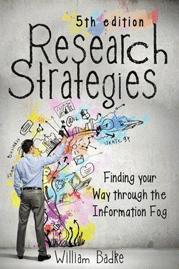
 | Think of Goldilocks and the three bowls of porridge - one too hot, one too cold, one just right, or one too much, one too little and one just the right amount. To get just the right amount of information when you search databases or Google to answer your assignment question...
|
 | 'Be aware that databases tend to be something of a black hole. You send in a request and the database tells you what it found (not what it didn't find). The database search program will rarely let you know what you did wrong or what might actually be available if you did a better search. It won't give you three 6.5's and an 8 like Olympic judges do. The data you want could well be in there, but you won't know that unless you vary your search strategies to draw it out' Badke, W. B. (2014). Research strategies: Finding your way through the information fog (5th ed., p. 117). Bloomington, IN: iUniverse. |
Watson M. How to undertake a literature search: a step-by-step guide.Br J Nurs. 2020;29(7):431–435. doi:10.12968/bjon.2020.29.7.431 |
| The key message from your searching in Google or any database is to think about the words you use and how you enter them in a database, AND unless you are using Google or Google Scholar, check your spelling. |
1. Duncan V, Holtslander L. Utilizing grounded theory to explore the information-seeking behavior of senior nursing students. J Med Libr Assoc. 2012;100(1):20-7.
2. Jones S, Allen J. Evaluating psychology students library skills and experiences. Psychol Teach Rev. 2012;18(2):94-115.
| « Time savers | Quiz » |



